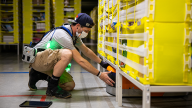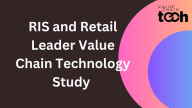Monetizing a more sustainable value chain

Becoming more sustainable from both environmental and social perspectives has now become widely accepted as fundamental to business reputation and performance.
It’s fundamental to employer brands — more and more people, especially millennials and zoomers — want to work for businesses that do the right thing,” said Lawrence Hutter, chairman of The Brand Experience Group and featured speaker at Value Chain Tech 2023. “It’s increasingly important to consumer brands — more and more consumers want to buy responsibly sourced products and services, especially those that are better educated, higher income and younger. It’s increasingly important to investors — more and more investors want to invest in ethically and sustainably run businesses, and typically see better returns. And finally, it’s increasingly important to business leaders, most of whom want to do the right thing in creating value for all of the stakeholders in their businesses.”
At Value Chain Tech, Hutter's presentation “The Path to Zero: Monetizing a More Sustainable Supply Chain” will focus on measuring how a business’ or brand’s ESG strategy and narrative translate into value creation. Hutter will highlight:
- Disconnects that typically exist between retailers’ ESG narratives and the issues that really influence customer choice and quantify the financial impacts of these disconnects.
- Explain how retailers and other consumer facing businesses can understand and remedy these disconnects, creating those virtuous circles of sustainable business practices, authentic purposeful brand narratives, positive consumer engagement and informed choice at scale.
- Introduce a technique that allows the authenticity of a business or brand’s ESG strategy to be measured, highlighting risks of greenwashing where they might exist.
Sustainable value chain
An increasing number of businesses, especially new market entrants, are also putting their sustainability credentials at the heart of their brand promise. This often creates challenges for long-established brands who, while working hard to become more sustainable, struggle to be seen as authentic given their history.
“More and more businesses are making public commitments about their environmental goals, such as becoming net-zero in carbon footprint by a given date,” Hutter said.
Measuring performance versus these commitments is clearly key and global reporting standards (supported by the International Financial Reporting Standards) are emerging for impacts on people and planet, as well as for the governance that businesses put in place. However, while the business case for becoming more sustainable is increasingly accepted by business leaders, most businesses are still unable to measure how their ESG strategies and narratives translate into individual engagement, preference and choice — hence into value creation.
“Retailers have a major role to play in building a better, more sustainable world through the way they touch and enable people’s lives every day, informing the choices they make about the products they buy and consume,” Hutter said. “The challenge most retailers have is that most of their value chain impact lies outside their business. For a typical grocery retailer, for example, less than 10% of their environmental impact lies within the perimeter of their business; more than 90% lies in the up-stream value chain of the products they sell.”
In turn, Hutter explained retailers need to:
- Make their own operations more sustainable — for example, becoming net zero in carbon footprint across their distribution system and stores.
- Work category by category with their suppliers to improve the performance of their upstream value chains from both environmental and social perspectives.
- Communicate the value proposition of these more sustainable products to customers that care in the most engaging and compelling way, in-store and on-line. Measuring and optimizing this is key.
“Scale is generally an advantage here because of the leverage it brings,” Hutter said. “It provides the opportunity for retailers to work with their major suppliers in areas such as regenerative agriculture, animal welfare, renewable energy, electrification and many others.”
Authentic brand narratives
What’s clear and measurable is that more individuals make choices influenced by considerations of product reputation and claims. For example, that damaging pesticides were not used, animals were well treated, forests were protected, workers had good conditions, etc.

Businesses that do the right thing and tell their story well can win a real sustainability dividend,” Hutter said. “This creates a virtuous circle of sustainable business practices, purposeful brand narratives, positive consumer engagement, informed choice at scale and resulting revenue growth value creation.”
However, it is vital that businesses are authentic in the claims they make.
“We live in a world where, ultimately, everything is in the public domain,” Hutter said. “Every claim must be substantiated. Businesses that overstate their environmental claims will be found out. Businesses that falsely claim that there is no child labor in their value chains will be found out. Greenwashing will be punished by consumers and investors in such businesses will find the value of their investments diminished.”
Hear more from Hutter at Value Chain Tech, this September 25-27 in Seattle. RL and RIS are joining forces to debut a new event focused on the technologies that power the key pillars of value chain success: agility, resiliency, collaboration and sustainability.
This article originally appeared on Retail Leader, a sister publication of RIS News.




